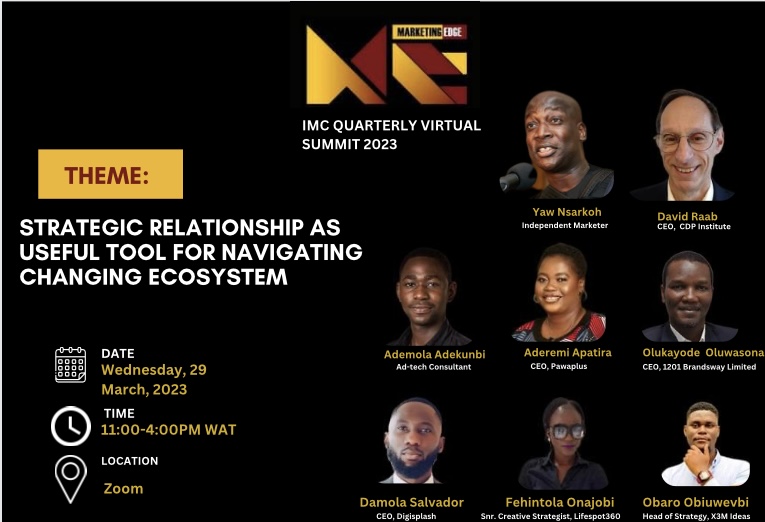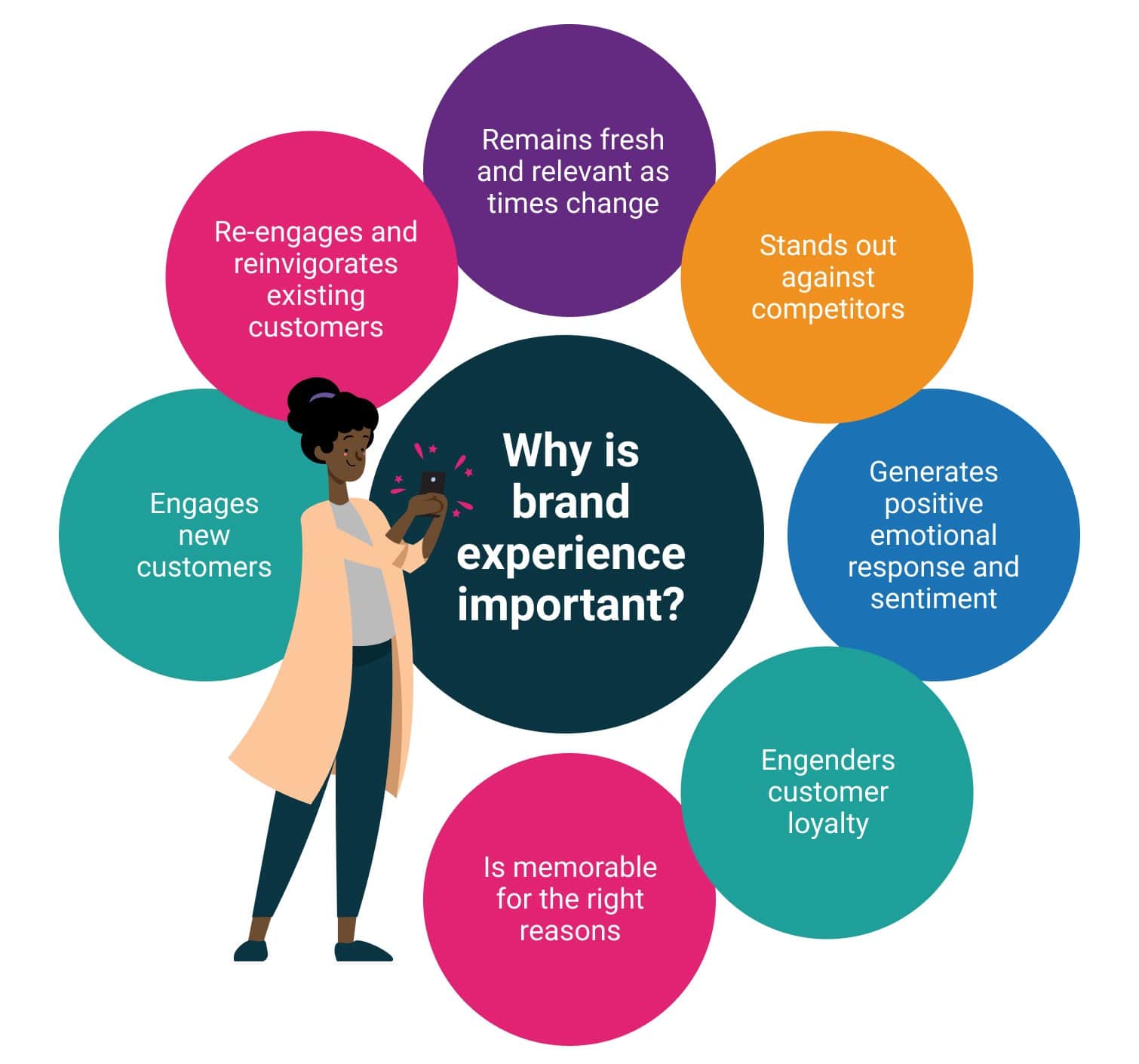As technological advancements continue to change consumer behaviour and disrupt traditional industry functions, marketing, branding and advertising around the world is going through a very apparent shift.
In response to this shift, ace marketers, industry thought leaders, strategists, creatives, data experts and agency head honchos recently converged and delivered remarkable presentations at the just concluded MARKETING EDGE first Quarterly Virtual Summit, 2023. The crux of their presentations pointed to one thing: the services of marketing, irrespective of methods, should be geared towards the ultimate goal – to serve humanity.
The summit, which was held on Wednesday, 29 January, 2023, via Zoom, featured the following themes: In search of Innovation: The Role of Policymakers & Market Leaders in a VUCA Economy; Climbing the Value Chain: Scenario Planning As Panacea For Complex Marketing Environment and Strategic Relationship as Useful Tool For Navigating Changing Ecosystem.
The summit was moderated by Ozone Mbanefo, founder of Nigeria’s leading adschool of brands, O2 Academy and saw some marketing communication industry’s bests addressing contemporary issues and proffering workable solutions.
In his opening remarks, John Ajayi, CEO and Publisher of MARKETING EDGE magazine and convener of the summit, said the initiative is part of a quarterly series aimed at setting an agenda for industry conversation and promoting the brand idea in the IMC ecosystem.
Underscoring the importance of technology and innovation in brand building and marketing, and the ways in which they are transforming the world, Mr. Ajayi noted that they are indispensable for marketers’ response to a volatile and uncertain business environment. He, therefore, called on marketers, IMC practitioners, policymakers, entrepreneurs, business leaders and financiers to come together in partnership.
“Equally important is our collaboration in this great effort. Experience has convinced us that it is only through partnership, multi-stakeholder and multilateral cooperation that we can truly accelerate progress and overcome uncertainties. Equally important are deployment of innovations and technological solutions on a scale that will reach their target audience,” Mr. Ajayi noted.
In his keynote titled “Avoiding The New Marketing Myopia – Returning Marketing To Its Noble Roots”, Yaw Nsarkoh, former Executive Vice President of Unilever Ghana and Nigeria, and an Independent Marketer emphasised a humane and compassionate approach to marketing.
Drawing copiously from some of the finest minds in marketing, innovation, invention, entrepreneurship, science, technology, philosophy, literature, politics and other disciplines, Mr. Nsarkoh traversed decades, centuries and millennia to powerfully drive home his groundbreaking message.
From Bola Ahmed Tinubu, Nigeria’s President-elect, to Professor Chinua Achebe, father of Africa’s modern Literature, to then Harvard University’s Professor Theodore Levitt’s pioneering article, Marketing Myopia, to the inventive and industrialist ingenuity of William Hesketh Lever, founder of Unilever, to Henri Nestle, founder of Nestle company, to Jamsetji Tata, founder of the Tata Company, among many influential others, down to the ruins of Thebes in Egypt where the first-ever advertising was found written on a Papyrus in 3000 BC, Mr. Nsarkoh audaciously submitted that marketing, at its best, has much it can take pride in as its contribution to improving the human condition.
“Many of the founders and innovators of products and services did so to serve humanity. Marketing is a core profession in the evolution of humanity for the better,” he said.
The ace Independent Marketer, however, cited greed, profiteering, short-termism, shareholder primacy and Neoliberal Capitalism as distinct threats to wholesome and noble marketing, and, by extension, threats to all professions, and all of human existence.
“I bow my head in shame that a mindless chase for short-term shareholder returns led marketers to do such things as: advertising alcoholic beverages and tobacco products at peak viewing and listening hours for children. Selling sugary products and promoting over-consumption of fatty products which then resulted in an epidemic of obesity and diabetes, and the rise of many lifestyle diseases.
“Turning a blind eye to brand building value chains that include slavery and do long term ecological damage, destroying this one earth we must all live on and promoting destructive, irresponsible, and wasteful consumerism. Some people will stop at nothing, including destroying the earth, to make a profit,” he lamented.
On his part, David Raab, another Lead Speaker and a New York based founder and CEO of the Customer Data Platform Institute, a vendor-neutral organization that educates organizations about customer data management presented the theme: “Thriving Amid Change”.
Mr. Raab noted that change is unpredictable and pointed out that the best leaders can do is to create conditions for success since they cannot predict change.
Highlighting that marketing is not a standalone profession, he stressed that it works in line with all aspects of human development.
“For the marketing communication industry and practitioners to thrive amid change, they have to cross-train their staff, apply agile processes, deploy collaboration tech and acquire redundant resources. Brands and businesses must have contingency plans because business leaders and policymakers cannot predict change,” Mr. Raab said.
The data specialist averred that no company or brand can assemble all possible resources by itself, adding that strategic relationships are needed to give access to resources that a brand or business doesn’t have.
“To build successful relationships, brands and businesses need to pick the right partners who are likely to deliver during a crisis. They also need to learn from the partners ahead of any possible crisis,” Mr. Raab advised.
Kayode Oluwasona, , the CEO of 1201 Brandsway Limited, a Multi-Channel Marketing Communications Company, who spoke on the theme: “Strategic Relationship as Useful Tool for Navigating Changing Ecosystem”, argued that strategy should be seen as the “how” a company or brand achieves its long-term goal.
Mr. Oluwasona, who drew his analogy extensively from the biological ecosystem, posited that brands and businesses can’t be talking of strategy if they don’t have objectives, stressing that business relationships succeed or fail based on the aims and objectives of the relationship.
“Aimless or baseless engagements are not meant to achieve anything meaningful. Therefore, building a strategic relationship in an ecosystem should be deliberate. Relationships with the ecosystem should always be nurtured, not just during crises. At the end of the day, all of us should be driving towards a common end,” he concluded.
Also speaking on theme: “In search of Innovation: The Role of Policymakers & Market Leaders in a VUCA Economy”, Aderemi Apatira, founder and Lead Consultant of October20 Communications Limited, bemoaned the inability of policymakers in Nigeria to employ innovation and data in solving the myriad of problems bedeviling the country. She described innovation as simply problem-solving and looking for a new way of solving a problem in an environment. While pointing out that innovation calls for constant training and upskilling of a company’s workforce, Mrs. Apatira underscored the need to apply innovation in navigating a VUCA environment.
Obaro Obiuwevbi, a highly accomplished strategist in the advertising industry in Nigeria and the Head of Strategy at X3M Ideas, a leading advertising agency, spoke on the theme: “Strategic Relationship as Useful Tool For Navigating Changing Ecosystem”.
Emphasising that strategic relationship is the “almighty formula” for business growth and learning, Mr. Obiuwevbi argued that, in choosing strategic partners, brands and businesses, there must be alignment, proof of verifiable successes and chemistry.
“You must be capable of sticking to your guts. In the fast changing world, you have to either adapt or die,” he said.
On his part, Damola Salvador, the CEO and Lead Strategist at Digisplash, a content-led, integrated marketing and award-winning advertising agency, spoke on the theme: Climbing the Value Chain: Scenario Planning As Panacea For Complex Marketing Environment.
The quarterly virtual summit, which brilliantly climaxed with Mr. Nsarkoh’s keynote, built a solid connection, for at least as long as it lasted, by using real stories, history, personal anecdotes and observations to help the audience connect to the themes on personal and professional levels. In all, marketers were called to keep marketing on the path of service to humanity.







Comment
No comments found.